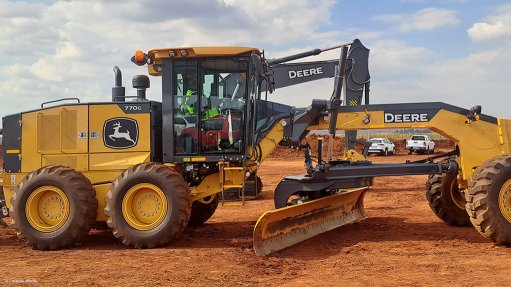Mayor says action being taken to improve water conditions
In the past year, the Ekurhuleni metro municipality exceeded its water demand allocation by the Department of Water and Sanitation from the Vaal system by 4.5%, mayor Mondli Gungubele said at the Summit for Sustainable Water and Wastewater Management in Local Government in South Africa: Bridging the Skills Gap, held last month.
He added that the water demand in Ekurhuleni was 356-million kilolitres last year and that the adequacy of water resources and the availability of the related infrastructure were major concerns for water managers.
It was imperative that water losses be reduced and available resources be conserved, Gungubele pointed out.
“Our city continues to lose thousands of kilolitres of water each year, which is unacceptable. “To this end, the municipality has developed a ten-year Water Conservation and Water Demand Management Plan that aims to reduce the non-revenue water from the current level of 37.7% to less than 20%,” he said.
Gungubele explained that the programme included water pressure management, pipe replacement, meter management, leak repairs, treated effluent reuse and cathodic protection.
He also highlighted that 106 km of water pipes have been replaced in Ekurhuleni since last year.
“The national Department of Water and Sanitation is making an effort to ensure that the desalination of acid mine drainage (AMD) in and around Johannesburg to potable quality is done by 2018, which is a very welcome inter- vention.”
Gungubele pointed out that understanding the strain of limited water resources required innovative thinking and, given the challenges of the availability of these resources, the Ekurhuleni metro municipality was aiming to diversify the mix of its water sources.
The municipality was exploring the reclamation and reuse of rainwater harvesting, groundwater and treated effluent from its East Rand Water Care Association wastewater treatment works, as well as using neutralised or desalinated AMD water.
“We will also explore the use of the treated effluent as a substitution for potable water for irrigation requirements and for potable direct or indirect use,” Gungubele stated.
The use of reclaimed water from the wastewater treatment works for direct potable purposes was a major consideration to be taken into account, he noted, stating that it was fundamental to the success of the intervention.
“The presence of heavy metals, pharmaceutically active and endocrine- disrupting compounds in wastewater effluent remains a major cause for concern that needs to be thoroughly researched,” he said.
Some of these concerns pertain to the reuse of treated effluent – which include high treatment costs and technologies, such as membrane and nanotechnology – that will require high levels of electrical energy and high levels of quality and risk management.
Gungubele added that there were no clear regulations and policies that provided guidance on the use of treated effluent.
“The City of Ekurhuleni is intensifying its efforts to monitor the quality of wastewater that is deposited into its sewers as this affects the treated effluent quality,” he said.
He noted that the municipality had a huge backlog of R2.8-billion for the replacement, upgrading and extension of water infrastructure in Ekurhuleni and that it would invest significantly in upgrading the city’s water infrastructure this year.
“A maintenance levy for the water infrastructure was established [in 2013] and ringfenced to clear maintenance backlogs. “This way, we are convinced that we will significantly reduce water losses as a result of pipe bursts and leaks.”
Gungubele stated that management capability was critical, as infrastructure matured and that it was crucial to use the right skills to deal with this matter.
“Therefore, the recruitment of the right technical professionals and development of technical capabilities should be non-negotiable,” he concluded.
Comments
Press Office
Announcements
What's On
Subscribe to improve your user experience...
Option 1 (equivalent of R125 a month):
Receive a weekly copy of Creamer Media's Engineering News & Mining Weekly magazine
(print copy for those in South Africa and e-magazine for those outside of South Africa)
Receive daily email newsletters
Access to full search results
Access archive of magazine back copies
Access to Projects in Progress
Access to ONE Research Report of your choice in PDF format
Option 2 (equivalent of R375 a month):
All benefits from Option 1
PLUS
Access to Creamer Media's Research Channel Africa for ALL Research Reports, in PDF format, on various industrial and mining sectors
including Electricity; Water; Energy Transition; Hydrogen; Roads, Rail and Ports; Coal; Gold; Platinum; Battery Metals; etc.
Already a subscriber?
Forgotten your password?
Receive weekly copy of Creamer Media's Engineering News & Mining Weekly magazine (print copy for those in South Africa and e-magazine for those outside of South Africa)
➕
Recieve daily email newsletters
➕
Access to full search results
➕
Access archive of magazine back copies
➕
Access to Projects in Progress
➕
Access to ONE Research Report of your choice in PDF format
RESEARCH CHANNEL AFRICA
R4500 (equivalent of R375 a month)
SUBSCRIBEAll benefits from Option 1
➕
Access to Creamer Media's Research Channel Africa for ALL Research Reports on various industrial and mining sectors, in PDF format, including on:
Electricity
➕
Water
➕
Energy Transition
➕
Hydrogen
➕
Roads, Rail and Ports
➕
Coal
➕
Gold
➕
Platinum
➕
Battery Metals
➕
etc.
Receive all benefits from Option 1 or Option 2 delivered to numerous people at your company
➕
Multiple User names and Passwords for simultaneous log-ins
➕
Intranet integration access to all in your organisation


















